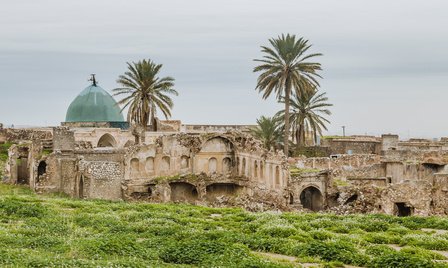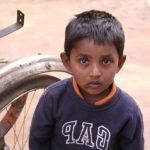 The one I want to wrap in my arms and bring home is Nebras.
The one I want to wrap in my arms and bring home is Nebras.
I didn’t even know her name when I return to Iraq, shortly after the assault on Baghdad. I am armed only with a photo of a beggar touching her nose with her tongue.
I had met her a few months before, when I’d traveled to Iraq with a women’s delegation, just five weeks before the U.S. bombings and invasion. Unfazed by impending disaster, the little girl, old enough to be in primary school, had begged for handouts in a popular market. I had taught her to touch her nose with her tongue. We’d teased; clearly she wasn’t used to an adult making faces at her and delighting in her company. She’d followed me around the souk nearly swallowing her tongue in laughter as she imitated my nose-touching stunt.
She was cold. The dirty scarf wrapped loosely around her neck neither protected her from the chill nor hid her calculating ability to work the shoppers. Without a translator, the most I gathered was a photo of a gleeful girl with laughing eyes and an incredibly acrobatic tongue.
When I return to Iraq five months later to find how war had touched the people who had so deeply touched me, translators are reluctant to take me to the souk. The mood in Baghdad has shifted; gunfire is heard nightly and no one wants to be responsible for my harm. Finally, the day before I am to leave, I convince one translator to take me “shopping.” I canvass the cluttered shops for hours, flashing the little girl’s photo.
 “Yes, that’s Nebras.” Finally, a shopkeeper recognizes the girl whose deep, brown eyes had humanized the smoldering CNN newscasts that absorbed my life back home. “But I haven’t seen her in a while. Not since before the war.”
“Yes, that’s Nebras.” Finally, a shopkeeper recognizes the girl whose deep, brown eyes had humanized the smoldering CNN newscasts that absorbed my life back home. “But I haven’t seen her in a while. Not since before the war.”
I catch my breath. I had just learned Nebras’ name. She can’t be one of the thousands of nameless Iraqis we dismissively call “collateral damage.” I step out into the bright sunlight and my translator catches my arm.
“We need to leave,” he insists. The equally insistent gunfire across the river rattles my nerve. I feel conspicuous in the souk’s crowded narrow alleys. People dart, avoiding eye contact. Shops close prematurely. Barricaded soldiers seem hyper-alert in the edgy heat.
As we worm our way back to our car, I stifle my creeping panic. Behind me, a commotion suddenly erupts and I turn around to see a crowd of men shoving toward me. I freeze. The shopkeepers part, revealing the terrified eyes of a familiar elfish girl they drag toward me by the scruff of her T-shirt.
Nebras doesn’t recognize me at first. Not until I show her photos of herself does she smile. Backed against a shop facing a tight crowd of curious men, Nebras retreats shyly, studying her photo intently. I shoo back the men who had treated this beggar only as a nuisance and, kneeling before her, I ask the interpreter to tell her I had come from America to see her.
Without warning, the overwhelmed girl lunges forward and kisses me on the lips.
We buy her an ice cream from a passing vendor. She unwraps it and holds it out to me. My defenses melt. After two weeks of rigorous attention to all food and water that passed my lips, I lick the sweet streetfare sacrificing my intestines to this little girl’s pleasure at hosting a visitor with all she could offer.
She’s an only child who doesn’t know her age. It was particularly ironic that we had met outside the Al Mustanseria University, the world’s oldest science college, built in 1233. This school-less girl’s only education is learned navigating the streets outside the university’s ancient walls.
I empty my purse of dinars, stuffing the oily bills into her plastic purse. She gleefully buys another ice cream for us to share.
Military helicopters zigzag overhead. Rumors that the American troops had closed bridges and jammed traffic make us jittery. Nebras escorts me out of the dicey souk, grabbing my hand and expertly keeping my skirt from being snagged by the ubiquitous wartime razor wire.
As we pass a store being repainted, she mentions it had been hit during the war’s initial attacks. She had spent the long nights of the early bombings in a nearby mosque.
I hug her harder than I intended. I feel her wiry hair against my cheek, her grungy T-shirt against my shoulder, her warm, open heart so willing to accept mine.
And then I’m gone.
—
“Tongue-Tied” originally appeared in Female Nomad and Friends: Tales of Breaking Free and Breaking Bread Around the World by Rita Golden Gelman with Maria Altobelli, published by Three Rivers Press, an imprint of the Crown Publishing Group, a division of Random House, Inc., in June 2010.
This piece was the first place winner in Dave’s Travel Corner 2011 Travel Writing Contest.







Leave a Reply